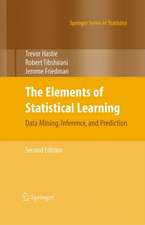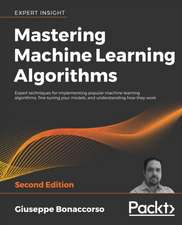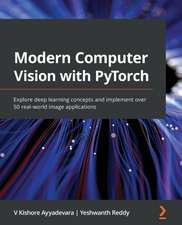Computer Vision: Algorithms and Applications: Texts in Computer Science
Autor Richard Szeliskien Limba Engleză Hardback – 5 ian 2022
More than just a source of “recipes,” this exceptionally authoritative and comprehensive textbook/reference takes a scientific approach to the formulation of computer vision problems. These problems are then analyzed using the latest classical and deep learning models and solved using rigorous engineering principles.
Topics and features:
- Structured to support active curricula and project-oriented courses, with tips in the Introduction for using the book in a variety of customized courses
- Incorporates totally new material on deep learning and applications such as mobile computational photography, autonomous navigation, and augmented reality
- Presents exercises at the end of each chapter with a heavy emphasis on testing algorithms and containing numerous suggestions for small mid-term projects
- Includes 1,500 new citations and 200 new figures that cover the tremendous developments from the last decade
- Provides additional material and more detailed mathematical topics in the Appendices, which cover linear algebra, numerical techniques, estimation theory, datasets, and software
Din seria Texts in Computer Science
- 17%
 Preț: 366.69 lei
Preț: 366.69 lei - 20%
 Preț: 675.35 lei
Preț: 675.35 lei - 20%
 Preț: 370.59 lei
Preț: 370.59 lei - 20%
 Preț: 411.75 lei
Preț: 411.75 lei - 20%
 Preț: 306.35 lei
Preț: 306.35 lei - 20%
 Preț: 474.58 lei
Preț: 474.58 lei - 20%
 Preț: 1244.39 lei
Preț: 1244.39 lei - 20%
 Preț: 409.70 lei
Preț: 409.70 lei - 20%
 Preț: 379.63 lei
Preț: 379.63 lei - 20%
 Preț: 444.93 lei
Preț: 444.93 lei - 20%
 Preț: 305.30 lei
Preț: 305.30 lei - 20%
 Preț: 406.21 lei
Preț: 406.21 lei - 20%
 Preț: 503.87 lei
Preț: 503.87 lei - 20%
 Preț: 370.22 lei
Preț: 370.22 lei - 20%
 Preț: 411.53 lei
Preț: 411.53 lei - 20%
 Preț: 423.52 lei
Preț: 423.52 lei - 20%
 Preț: 441.70 lei
Preț: 441.70 lei - 20%
 Preț: 515.34 lei
Preț: 515.34 lei - 15%
 Preț: 637.58 lei
Preț: 637.58 lei - 20%
 Preț: 353.33 lei
Preț: 353.33 lei - 20%
 Preț: 356.82 lei
Preț: 356.82 lei - 20%
 Preț: 181.92 lei
Preț: 181.92 lei - 20%
 Preț: 330.42 lei
Preț: 330.42 lei - 20%
 Preț: 743.62 lei
Preț: 743.62 lei - 20%
 Preț: 663.45 lei
Preț: 663.45 lei -
 Preț: 457.75 lei
Preț: 457.75 lei - 20%
 Preț: 536.66 lei
Preț: 536.66 lei - 20%
 Preț: 358.24 lei
Preț: 358.24 lei -
 Preț: 385.84 lei
Preț: 385.84 lei - 20%
 Preț: 394.57 lei
Preț: 394.57 lei - 20%
 Preț: 344.76 lei
Preț: 344.76 lei - 20%
 Preț: 621.18 lei
Preț: 621.18 lei - 20%
 Preț: 350.86 lei
Preț: 350.86 lei - 20%
 Preț: 348.89 lei
Preț: 348.89 lei - 20%
 Preț: 339.95 lei
Preț: 339.95 lei - 20%
 Preț: 588.21 lei
Preț: 588.21 lei - 20%
 Preț: 199.57 lei
Preț: 199.57 lei - 20%
 Preț: 341.30 lei
Preț: 341.30 lei - 23%
 Preț: 726.93 lei
Preț: 726.93 lei - 20%
 Preț: 325.30 lei
Preț: 325.30 lei - 20%
 Preț: 595.80 lei
Preț: 595.80 lei - 20%
 Preț: 593.48 lei
Preț: 593.48 lei -
 Preț: 454.30 lei
Preț: 454.30 lei
Preț: 460.78 lei
Preț vechi: 575.98 lei
-20% Nou
88.17€ • 92.06$ • 72.97£
Carte disponibilă
Livrare economică 14-28 martie
Livrare express 28 februarie-06 martie pentru 117.49 lei
Specificații
ISBN-10: 3030343715
Pagini: 922
Ilustrații: XXII, 925 p. 518 illus., 144 illus. in color.
Dimensiuni: 210 x 279 x 63 mm
Greutate: 2.77 kg
Ediția:2nd ed. 2022
Editura: Springer International Publishing
Colecția Springer
Seria Texts in Computer Science
Locul publicării:Cham, Switzerland
Cuprins
Notă biografică
Dr. Richard Szeliski has more than 40 years’ experience in computer vision research, most recently at Facebook and Microsoft Research, where he led the Computational Photography and Interactive Visual Media groups. He is currently an Affiliate Professor at the University of Washington where he co-developed (with Steve Seitz) the widely adopted computer vision curriculum on which this book is based. He was awarded the IEEE Computer Society PAMI Distinguished Researcher Award in 2017 and is an IEEE and ACM Fellow.
Textul de pe ultima copertă
Computer Vision: Algorithms and Applications explores the variety of techniques used to analyze and interpret images. It also describes challenging real-world applications where vision is being successfully used, both in specialized applications such as image search and autonomous navigation, as well as for fun, consumer-level tasks that students can apply to their own personal photos and videos.
More than just a source of “recipes,” this exceptionally authoritative and comprehensive textbook/reference takes a scientific approach to the formulation of computer vision problems. These problems are then analyzed using the latest classical and deep learning models and solved using rigorous engineering principles.
Topics and features:
- Structured to support active curricula and project-oriented courses, with tips in the Introduction for using the book in a variety of customized courses
- Incorporates totally new material on deep learning and applications such as mobile computational photography, autonomous navigation, and augmented reality
- Presents exercises at the end of each chapter with a heavy emphasis on testing algorithms and containing numerous suggestions for small mid-term projects
- Includes 1,500 new citations and 200 new figures that cover the tremendous developments from the last decade
- Provides additional material and more detailed mathematical topics in the Appendices, which cover linear algebra, numerical techniques, estimation theory, datasets, and software
Suitable for an upper-level undergraduate or graduate-level course in computer science or engineering, this textbook focuses on basic techniques that work under real-world conditions and encourages students to push their creative boundaries. Its design and exposition also make it eminently suitable as a unique reference to the fundamental techniques and current research literature in computer vision.
About the Author
Dr. Richard Szeliski has more than 40 years’ experience in computer vision research, most recently at Facebook and Microsoft Research, where he led the Computational Photography and Interactive Visual Media groups. He is currently an Affiliate Professor at the University of Washington where he co-developed (with Steve Seitz) the widely adopted computer vision curriculum on which this book is based.
Caracteristici
Structured to support active curricula and project-oriented courses
Provides, exercises and additional readings, as well as supplementary material
Descriere
Humans perceive the three-dimensional structure of the world with apparent ease. However, despite all of the recent advances in computer vision research, the dream of having a computer interpret an image at the same level as a two-year old remains elusive. Why is computer vision such a challenging problem and what is the current state of the art?
Computer Vision: Algorithms and Applications explores the variety of techniques commonly used to analyze and interpret images. It also describes challenging real-world applications where vision is being successfully used, both for specialized applications such as medical imaging, and for fun, consumer-level tasks such as image editing and stitching, which students can apply to their own personal photos and videos.
More than just a source of “recipes,” this exceptionally authoritative and comprehensive textbook/reference also takes a scientific approach to basic vision problems, formulating physical models of the imaging process before inverting them to produce descriptions of a scene. These problems are also analyzed using statistical models and solved using rigorous engineering techniques
Topics and features:
- Structured to support active curricula and project-oriented courses, with tips in the Introduction for using the book in a variety of customized courses
- Presents exercises at the end of each chapter with a heavy emphasis on testing algorithms and containing numerous suggestions for small mid-term projects
- Provides additional material and more detailed mathematical topics in the Appendices, which cover linear algebra, numerical techniques, and Bayesian estimation theory
- Suggests additional reading at the end of each chapter, including the latest research in each sub-field, in addition to a full Bibliography at the end of the book
- Supplies supplementary course material for students at the associated website, http://szeliski.org/Book/
Suitable for an upper-level undergraduate or graduate-level course in computer science or engineering, this textbook focuses on basic techniques that work under real-world conditions and encourages students to push their creative boundaries. Its design and exposition also make it eminently suitable as a unique reference to the fundamental techniques and current research literature in computer vision.





